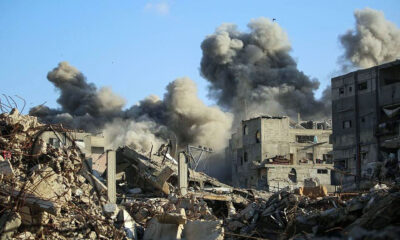International
Palestinians urge world to end Israel’s illegal occupation after ICJ ruling

Palestinians urge world to end Israel’s illegal occupation after ICJ ruling
Activists and legal experts in the West Bank say Friday’s ruling by the International Court of Justice (ICJ), which has found that Israel’s occupation of the Palestinian territories is unlawful, will do little to improve life for Palestinians.
Other states must now apply collective pressure on Israel to end its rule over Gaza and the West Bank, including annexed East Jerusalem, if the situation there is to change, they say.
The world’s highest court concluded on Friday – with 12-3 judges in favour – that Israel is forcibly displacing Palestinians from their lands, exploiting water sources, annexing large swaths of the occupied territory “by force” and is violating the right of Palestinians to “self-determination”.
The ICJ also ruled that Israel must stop all building of settlements in the West Bank and should compensate Palestinians for human rights violations in the occupied territory.
The ruling is a non-binding advisory opinion, which was sought by the United Nations General Assembly in 2022, seeking to clarify the legal implications of Israel’s occupation of the West Bank.
The ICJ called on the UN – especially the Security Council and General Assembly – to take action to bring Israel’s unlawful occupation to a “rapid” end.
However, Zainah el-Haroun, the spokesperson for Al-Haq, a Palestinian nonprofit organisation based in the West Bank that monitors human rights violations, said previous ICJ rulings have not led to global action against Israel.
She referenced the ICJ’s 2004 advisory opinion that found Israel’s separation wall and settlements on occupied Palestinian land illegal. Settlements have not only remained in the West Bank since the ruling, but the number of Israeli settlers living there has also risen from 250,000 in 1993 to more than 700,000 in 2023.
READ ALSO:
- Biden rejects calls to step down from presidential race
- Why I won’t go back to Peter Obi – Okupe
- DSS operatives raid kidnappers hideout in Kaduna, kill one, arrest another
“These rulings mean nothing if third states and the international community fail to hold Israel accountable,” she told Al Jazeera.
“The ICJ has ruled that Israel’s occupation is unlawful and must end immediately. Third states must ensure the full and total realisation of the Palestinian people to self-determination and sanction Israel’s illegal occupation, which breaches international law,” she added.
Little to celebrate
Palestinian activists in the West Bank said they cannot celebrate the ICJ’s ruling when the situation across the occupied territory is worse than ever before.
They cited Israel’s war in Gaza, which has killed at least 38,848 Palestinians – the vast majority of them civilians – and has rendered the enclave uninhabitable. Gaza is also witnessing an outbreak of diseases such as polio and cholera while nearly the entire population is struggling to survive food shortages brought on by Israel’s siege of the enclave.
Israel’s war on Gaza followed Hamas-led attacks on military outposts and communities in southern Israel on October 7, in which 1,139 people were killed and 251 taken captive.
The global attention – and shock – over Israel’s war ever since has distracted attention from its settlement expansion in the West Bank, observers said.
“A year ago, a ruling like this would have been great. We all would have thought this was a great step forward,” said Tasame Ramadan, a human rights activist from the West Bank city of Nablus. “But right now, the priority is a permanent ceasefire [in Gaza] and an end to the occupation.”
Mohamad Alwan, a Palestinian rights activist monitoring settler attacks in the West Bank, expressed a similar wariness about what the ruling will mean on the ground.
He said that while he recognises the ruling hurts Israel’s image abroad, there is no way for the court to apply or enforce it.
In addition, Alwan said he is pessimistic about whether states will take action against Israel after the ruling. He cited perceived indifference to the ICJ’s binding order in January, in which the court called on Israel to scale up aid and prevent further harm to civilians in Gaza after concluding that “the rights of Palestinians were at risk” under the Genocide Convention.
“In my opinion, this decision will have no immediate impact on the situation on the ground,” he told Al Jazeera.
READ ALSO:
- Police didn’t stop NASU, SSANU Abuja protest – CP
- Blackout looms in Abuja as TCN threatens to disconnect AEDC from grid
- CBN gives new directive on dormant accounts, unclaimed bank balances
“However, in the long run, there might be an impact. The world has seen now how Israel kills people and kills children, and their views are changing about Israel and its occupation.”
‘Nakba is where it all started’
Palestinian activists stressed that the ICJ’s advisory ruling on Friday must be understood in the context of the Nakba, or “Catastrophe”, of 1948 when Zionist militias expelled about 750,000 Palestinians from their lands to create the state of Israel.
Diana Buttu, a Palestinian legal expert, said she wished the ICJ had referenced the Nakba to highlight the historic pattern of Israel’s behaviour in the occupied territory.
“While I’m happy about the outcome of this case, I also think that this focus just on the West Bank and Gaza ignores the bigger picture of the origins of this situation and the ways in which Israel was created, which was through the ethnic cleansing of Palestinians,” Buttu told Al Jazeera.
She criticised the Palestinian Authority (PA), which governs large swaths of the West Bank and represents the Palestinian people internationally, for how the issue of Israel-Palestine is typically framed by and within the global community.
She accused the PA of having long given up advocating for stateless Palestinians to be able to exercise the right of return to their former homes and lands lost during the Nakba or calling for an end to the discrimination that Palestinian citizens of Israel face.
Experts and activists have previously attributed the PA’s shortcomings to the Oslo Accords, the first of which was signed in 1993 by then-Palestinian leader Yasser Arafat and then-Israeli Prime Minister Yitzhak Rabin on the lawn of the White House.
“The PA a long time ago took a position that it is all about the two-state solution and ending occupation, so their entire discourse has just been about that,” Buttu said.
Ramadan agreed on the importance of centring the Nakba whenever speaking about Israel’s settlements expansion and its war in Gaza.
“The Nakba is where this all started. How can we not mention the cause of the issue and where this all started? This is not the right way to address an issue like this,” she said.
“We would definitely like to see the international community recognise the Nakba, recognise all the people we lost in 1948 and to recognise the consequences of the Nakba that we are still living through today.”
Palestinians urge world to end Israel’s illegal occupation after ICJ ruling
International
UK Court Hands Life Sentence to Nigerian Teen for Knife Attack Killing

UK Court Hands Life Sentence to Nigerian Teen for Knife Attack Killing
A Nigerian teenager residing in the UK, Jackson Uwagboe, has been sentenced to life imprisonment for the murder of 21-year-old Robert Robinson, following a brutal knife attack in Lewisham, London. The sentencing was delivered at the Old Bailey on Wednesday.
The Metropolitan Police confirmed that 19-year-old Uwagboe of Hamilton Street, Lewisham, was found guilty of murder on Tuesday, 10 February 2026, in a case stemming from a dispute over a stolen bicycle. The court ruled that Uwagboe must serve a minimum of 21 years before he can be considered for parole.
Uwagboe’s co-defendant, Eromosele Omoluogbe, 24, was earlier convicted of perverting the course of justice after assisting Uwagboe in attempting to flee to Nigeria via Heathrow Airport.
READ ALSO:
- Ogun Gov Rewards Nigeria’s Best Primary School Teacher with Car, Bungalow
- Police Bust Gang Armoury, Arrest Two Suspects in Delta
- Peter Obi Launches ‘Village Boys Movement’ to Rival Tinubu’s City Boys Ahead of 2027
Prior to this sentencing, two other men, Ryan Wedderburn, 18, and Kirk Harris, had already been convicted and handed life sentences in May 2025 for their roles in the same murder.
Detective Inspector Neil Tovey, who led the investigation, described the incident as a “brutal and sustained attack”. He said, “Robert was subjected to a brutal and sustained attack by a group of men armed with knives. He was unarmed, already wounded, and on the ground when Uwagboe attacked him. Today’s verdict brings justice for Robert Robinson and his family.”
The case has drawn attention to youth violence, knife crime, and gang-related activity in London, as well as the challenges faced by law enforcement in preventing violent disputes over seemingly minor disputes such as bicycle theft.
The sentencing underscores the UK judicial system’s approach to serious violent crimes, ensuring that perpetrators face long-term incarceration while providing a clear minimum term before parole consideration.
UK Court Hands Life Sentence to Nigerian Teen for Knife Attack Killing
International
UK-Based Nigerian Gets 13-Year Jail Term for Forcing Girlfriend to Abort Pregnancy

UK-Based Nigerian Gets 13-Year Jail Term for Forcing Girlfriend to Abort Pregnancy
A UK-based Nigerian man, Adeleke Adelani, has been sentenced to more than 13 years’ imprisonment for unlawfully aborting the pregnancy of his former partner after coercing her to take abortion medication on Valentine’s Day.
The offence occurred in 2020 when Adelani, then 28 years old, deceptively invited the woman — whose identity is legally protected — to his residence in Letterkenny under the guise of discussing the future of her pregnancy. Evidence before the court showed that the victim was nine weeks pregnant at the time of the incident.
Prosecutors told the court that upon her arrival, Adelani threatened the woman with violence and forced her to ingest five tablets of misoprostol, a drug used for medical abortions, thereby causing the unlawful termination of the pregnancy. The court heard that the defendant had researched the medication in advance and acted deliberately. The victim later contacted authorities, leading to Adelani’s arrest by Irish police.
READ ALSO:
- Lawmaker Jailed for Mocking President in Facebook Post
- Police to Arrest TikToker Mirabel After She Recants False Rape Claim
- Tinubu Reduces Reliance on U.S, Strengthens Defence Partnerships With Turkey, EU
At the time of the sentencing, Adelani was already serving a separate seven-year prison sentence for an unrelated offence. He had initially been due to stand trial last year but pleaded guilty before jury selection began, accepting responsibility for the charges brought against him.
During the sentencing hearing at the Letterkenny Circuit Court, the victim delivered a powerful impact statement, explaining that although she had chosen to forgive Adelani, the consequences of his actions would remain with her for life.
“I have forgiven the defendant,” she told the court. “That forgiveness does not mean what he did was acceptable. It means I refuse to let what he did continue to control my heart and my life. When he wrongfully imprisoned me and caused the termination of my nine-week pregnancy, he took far more than my freedom. He took my child. He took my sense of safety. He took a future that I had already begun to plan and love.”
In a letter read aloud in court, Adelani apologised to the victim, accepted full responsibility for his actions, and expressed remorse for the pain and trauma he caused.
Delivering judgment, John Aylmer described the crime as deliberate, premeditated, and deeply traumatic, stressing that it involved coercion, abuse, and a serious violation of trust. The judge sentenced Adelani to 11 years in prison, with the final two years suspended, for causing the unlawful termination of a pregnancy, and an additional five years, with the last 12 months suspended, for assault causing harm.
The sentences are to run concurrently, adding to Adelani’s existing term and resulting in an overall prison sentence exceeding 13 years. The case has reignited debate in Ireland and internationally about reproductive coercion, domestic abuse, and violence against women, with legal observers describing it as one of the most serious cases of its kind in recent years.
UK-Based Nigerian Gets 13-Year Jail Term for Forcing Girlfriend to Abort Pregnancy
International
Epstein, Ex-Israeli PM Named in Alleged Profiteering From Boko Haram Crisis

Epstein, Ex-Israeli PM Named in Alleged Profiteering From Boko Haram Crisis
A new investigative report by Drop Site News has alleged that the late American financier Jeffrey Epstein and former Israeli prime minister Ehud Barak leveraged Nigeria’s long-running Boko Haram insurgency to pursue commercial, security, and strategic interests in the country.
According to the investigation, emails released by the United States Department of Justice in 2018 show Epstein acting as a behind-the-scenes facilitator in discussions involving Jide Zeitlin, then chairman of Nigeria’s Sovereign Investment Authority, and Sultan Ahmed bin Sulayem, former chairman of DP World. The exchanges allegedly focused on attempts to secure control of key shipping terminals in Lagos and Badagry, following unsuccessful negotiations with successive Nigerian administrations dating back to 2005.
The report claims DP World was unwilling to invest in a proposed industrial zone in Nigeria without full or majority control of the adjoining port infrastructure, a demand that reportedly stalled the deal for years. Epstein, who died in a New York jail in 2019 while awaiting trial, is alleged to have helped revive talks by brokering introductions and strategic conversations.
READ ALSO:
- CBN Policies, Foreign Inflows Drive Naira to Two-Year Peak
- Edo Governor Okpebholo Names Mercy Johnson-Okojie Special Adviser
- Many Feared Dead as Suspected Lakurawa Militants Attack Kebbi Communities
Drop Site News further reported that bin Sulayem resigned on February 13 after renewed scrutiny of his past links to Epstein resurfaced publicly, intensifying attention on the historical port negotiations and the role of foreign intermediaries in Nigeria’s maritime sector.
Beyond logistics and port infrastructure, investigators highlighted what they described as near-daily correspondence between Epstein and Barak after the former Israeli leader left public office. Barak, who served as Israel’s defence minister until 2013, allegedly sought to deepen Israeli-Nigerian security cooperation, using Nigeria’s counter-insurgency battle as an entry point for Israeli-linked security, energy, and technology investments.
The report said Barak later relied on security networks in Nigeria to promote Israeli defence and surveillance firms. In 2015, Barak and a partner invested $15 million in FST Biometrics, founded by former Israeli intelligence chief Aharon Ze’evi Farkash. The firm’s Basel biometric system, originally deployed at Israel-Gaza crossings, was subsequently marketed in Nigeria as a counter-terrorism solution.
According to the investigation, the biometric technology was introduced at Babcock University as protection against Boko Haram threats, while also being pitched to African governments for broader identity management and population-control applications.
The report further cited a 2020 World Bank-supported initiative involving Israel’s National Cyber Directorate and Toka Group, a cyber-intelligence company co-founded by Barak. The partnership was presented as contributing to Nigeria’s national cybersecurity framework, but Drop Site News argued it also deepened Israeli corporate access to sensitive security architecture.
In its conclusion, the investigation alleged that a network of security interventions, port negotiations, and technology investments enabled Epstein and Barak to profit from instability associated with the Boko Haram conflict, while simultaneously advancing Israeli commercial and strategic interests in Nigeria. The outlet stressed that these claims are based on document reviews and correspondence, framing them as allegations rather than established legal findings.
Epstein, Ex-Israeli PM Named in Alleged Profiteering From Boko Haram Crisis
-

 International2 days ago
International2 days agoCanada Opens New Express Entry Draw for Nigerian Workers, Others
-

 Politics19 hours ago
Politics19 hours agoPeter Obi Launches ‘Village Boys Movement’ to Rival Tinubu’s City Boys Ahead of 2027
-

 News3 days ago
News3 days agoKorope Drivers Shut Down Lekki–Epe Expressway Over Lagos Ban (Video)
-

 News1 day ago
News1 day agoPolice to Arrest TikToker Mirabel After She Recants False Rape Claim
-

 Health3 days ago
Health3 days agoRamadan Health Tips: Six Ways to Stay Hydrated While Fasting
-

 Entertainment3 days ago
Entertainment3 days agoActress Destiny Etiko Breaks Silence on Alleged Nollywood Betrayal
-

 International1 day ago
International1 day agoEpstein, Ex-Israeli PM Named in Alleged Profiteering From Boko Haram Crisis
-

 metro2 days ago
metro2 days agoOsun Awards 55.6km Iwo–Osogbo–Ibadan Road Project to Three Contractors















